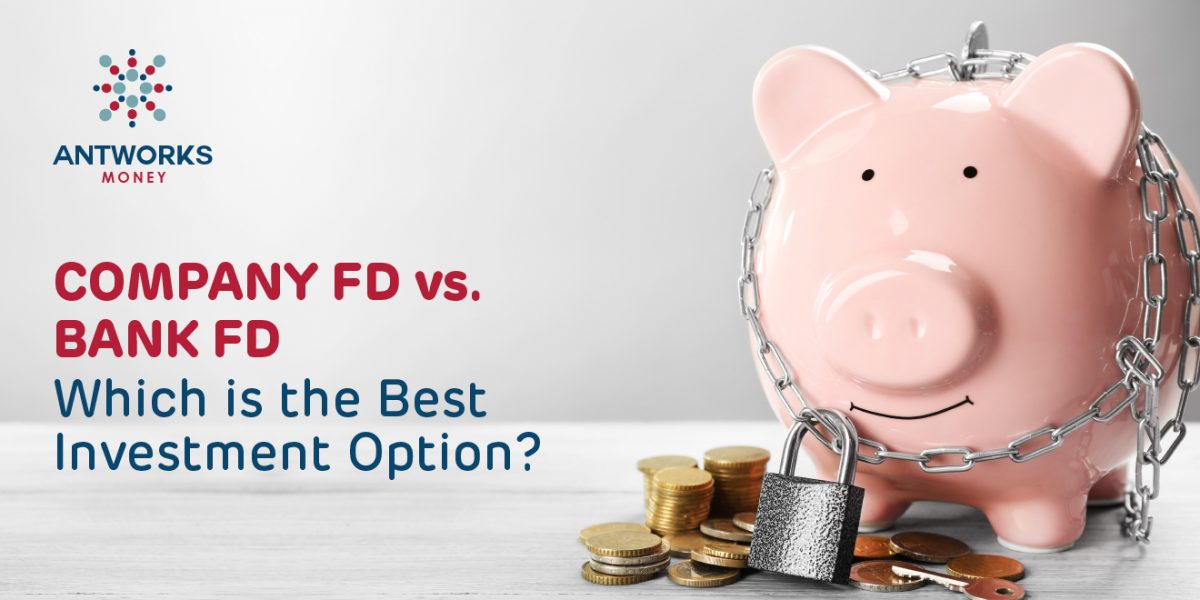
Company FD vs. Bank FD – Which is the Best Investment Option?
Since time immemorial, fixed deposits have been the most popular savings option for people. With the good interest rate offered by the banks, these definitely seemed to be the wisest choice. As you might be aware, fixed deposits are a onetime investment where you invest a certain amount for a fixed period of time. At the end of the term, the financial organization adds the promised interest amount to your savings, thus enhancing the funds invested by you. Needless to say, this is not only among the best investment option with assured returns but also risk free.
However, if you thought that only banks offer the fixed deposit option, think again. In today’s scenario even corporate houses offer fixed deposit options. The one thing to note is that there are a few similarities and dissimilarities between these and the conventional bank FDs.
Now, a lot of people find it hard to decide when it comes to choose from Company FDs vs. Bank FDs. In case you have also been rendered indecisive, we are here to help. So, let us get started.
What is a Company FD?
As the name suggests, company FD is a form of fixed deposit offered by corporate firms. You can invest or deposit your money into the corporate house for a fixed tenure at the end of which your sum would be enhanced.
Company FDs – Pros
- Higher Rates of Interest: When compared to the interest rate offered by the banks, you receive a higher rate of interest when investing in a company FD. Thus, you can look forward to better returns with company FDs.
- Short Tenure: If you are thinking of multiplying your savings within a short period of time, think Company FD. The company fixed deposits usually have a shorter tenure of about 6 months. So, you can quickly gain returns on your best investment option.
- Diversification of Investment: When investing in company FDs, you have a choice to invest your savings into a number of corporate houses. This is surely a great idea as this would mean diversification of loans. Also since different companies offer different rate of interest, you may be able to earn higher returns on investment in multiple companies.
Company FDs – Cons
- Higher Risk: Company fixed deposits can be a risky business, especially if you are investing in a company that is not so established. It could be possible that a company may not be able to offer you the promised amount at the end of the tenure as these deposits are influenced by the market conditions.
- No Deposit Assurance: Bank FDs offer an assurance that INR 100000 of an individual’s deposit would be protected come what may. However, in case of company FDs there is no such assurance.
- Early Withdrawal, a Complication: If you wish to withdraw the amount invested in a company FD before the conclusion of the tenure, you would have to face a very complex process.
- Tax Deduction: The interest on Company FD is subjected to tax deductions in case it is higher than INR 5000.
What are Bank FDs?
It was banks that first came up with the idea of offering fixed deposits. People have been using this to stow away their hard earned money expecting some good returns in the bargain. You can invest your money in a bank FD for a specific tenure at the end of which the interest amount will be added to the original sum.
Bank FDs – Pros
- No Risk: A bank FD is definitely one of the safest modes of investment as the interest rates are not influenced by the market fluctuations. Thus, you can be assured that the money invested by you would definitely get multiplied.
- Flexibility of Tenure: Banks offer a choice of tenure which can range from 6 months to 5 years. Based on your requirement, you can choose the tenure and look forward to some great returns.
- Options for Loan and Credit Cards: Did you know that in face of a cash crunch, you don’t have to withdraw your FD before the end of the term? Instead you can opt for a loan against the deposit. In such case you will get 90% of the value of the FD. What’s more, banks also offer credit cards against FDs. This is a great option as these render lower interests than the traditional loans and credit cards.
- Flexibility of Interest Payout: You can actually choose the intervals at which the interest should be paid to you. However, this depends on the kind of tenure you have signed up for. You can opt for a monthly, quarterly, half yearly or annual payout of interest.
Bank FDs – Cons
- Lower Returns: When compared to company FDs, the returns that you get on bank FDs are considerably lower.
- Penalty on Early Withdrawal: Banks render a penalty or fine on your FD, in case you wish to withdraw the amount before the end of the specified term.
- Deduction of Tax: If you thought that the interest that you receive on the FD amount is tax free, think again. Since, the interest you receive is also a part of your income a certain amount of tax will be deducted from it.
The Verdict: Company FD vs. Bank FD – Which is better?
This is a dilemma that most investors face. Well, if you are looking for better returns in a shorter period of time, company FDs are definitely a great option. However, before you invest in a company D make sure to conduct a background check on the organization and check its credibility. Investing in a renowned company surely reduces the risk. In case, you are not one to take risks and would prefer the conventional method, then bank FDs are best suited for you. Though the returns on such investments are lower, you definitely have peace of mind.
Both bank FDs as well as company FDs have their share of pros and cons. Thus it is mainly up to you to take a call. Considering your needs and your preferences will help you make a wise decision. An insight from an expert is also a good idea. So, stay wise and invest wise.





